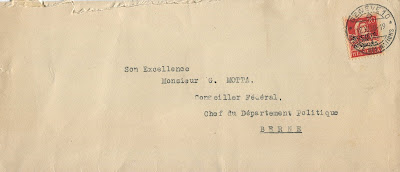League of Nations (SdN) Album
1922-30
(part 6 of a series)
It is both possible and quite interesting to trace the League’s
history during the 1920’s philatelically. To do that, look to the stamped covers
and special authorized cancellations. Some SdN covers continue to be available
in on-line auctions, a few of which have near-historical significance. The
League’s 100th anniversary (2020) has likely made the covers
increasingly scarce, however.
I’ve chosen two covers from
my collection for this post.
The cancellation sheets, favored by collectors in the 1920s, are
scarcer than the covers. These sheets are comprised of either SdN or Swiss
stamps cancelled on the days of League related conferences and meetings. The
SdN overprinted stamps shown here were all cancelled in Geneva while the Swiss
stamps were cancelled in the city where the meeting/congress was held. Cancellation
sheets for meetings in Lausanne, Rome, and Locarno appear in this post
Giuseppe
Motta cover
Motta, a Swiss diplomat, served as the League’s
president (1924-1925) and was honorary president of the League’s first
assembly, 1920. As the chief Swiss delegate from 1920 until his death in 1940,
he advocated membership for Germany, Switzerland’s most important economic
partner in the inter-war period, but opposed the admission of the Soviet Union.
He
wanted to make the League something more than a coalition of WWI victors -- an
idea disputed by France and hampered by the absence of the United States.
Motta
(1871-1940)
Cover
addressed to Motta, 12 November 1930, Scott # 2o13
Hague/Velleman
Cover
The International Peace Congress held at The Hague, 10-15 December
1922, was convened by the Amsterdam
International Federation of Trade Unions. Delegates attempted to find
common ground between unionist and the peace movement, but results were
disappointing. Russia introduced a series of pro-labor and war related policies
that were never adopted. This was not an SdN-sponsored congress.
The cover, dated 12 December 1922 and addressed to (Antoine) Velleman,
was forwarded to The Hague where, possibly, he was translating for the Peace
Conference. Velleman is credited with the invention of the simultaneous
translation system which allowed the League to conduct its business in real
time. The draft reply penned on the reverse of the cover references the
Congress.
Velleman
cover, 12 December 1922, Scott #s 2o8, 2o18
Lausanne,
Conference pour la Paix en Orient, November 1922 - July 1923
The Treaty of Lausanne, finally signed
on 24 July 1923, officially ended the war between Turkey and the allied forces
of Britain, France, Italy, Japan, Greece, Romania and the Serb-Croat-Slovene
State, which had continued since the onset of World War I. The Treaty defined
the borders of modern Turkey, except for those with Iraq. Turkey ceded claims
to the remainder of the Ottoman Empire and, in return, the Allies recognized
Turkish sovereignty within its new borders.
The treaty, composed of 143 articles,
deals with such matters as trade, borders, protection of minorities, access to
the Turkish Straits, and various binding letters. Among the agreements achieved:
foreign governments could no longer operate their own post offices in the new
Turkey (see Big Blue’s pre-WWI sections for Russia, Great Britain, Germany and
France). The future of Mosel and Iraq, including postal authority, remained
undefined and the matter was deferred.
The League authorized two cancelations
for the duration of the Conference. The sheet with Swiss airmail stamps (shown
below) has both cancels – dated 25 May 1923 – on Lausanne-Palace Hotel
stationary. Both French and Turkish delegates stayed at this hotel, causing
considerable “chatter” at the time.
Lausanne-Palace
Hotel, 14 December 1922 cancel
15
January 1923 cancel
Rome,
32nd Session
The
32nd League session, meeting in Rome on 8-13 December, 1924, had
agenda items with philatelic implications -- for example the frontier between
Turkey and Iraq and the British mandates for Iraq and Palestine. These matters
remained unresolved even though they had been partly “settled” a year earlier.
In
commenting on this session,
Aristide Briand, the French representative and a former French Premier, said
"The League of Nations will become great and powerful only when America
enters it" (New York Times, 13 December 1924). He hoped for
American assistance in arbitrating wars out of existence which, of course, he
did not get.
The
sheet of 12 canceled SdN stamps (below), bears Geneva 1 postmarks.
SdN
stamps, cancelled 10 December, 1924, day three of the 32nd session
Italy
also produced cancellations for the Rome session.
“Consiglio
Società Nazioni” Cancels
Locarno, 1925
The
Pact of Locarno (1 December 1925) produced a reconciliation between Germany and
the major League members -- France, Belgium, Great Britain, and Italy.
Widely acclaimed as a practical pattern for avoiding war, it “guaranteed” permanent
peace in Western Europe. Central and South-Eastern Europe, it was hoped, would
soon follow, then perhaps the whole world. Germany, as a result of this success,
was allowed to join the League (September 1926).
In 1936, however, Germany rejected
the Locarno agreements and invaded the neutral Rhineland. Locarno had
failed and, for fear of starting a war, the other League members did nothing to
prevent it.
Two
Locarno Cancels and a French Delegation Cachet
(from
reverse of following postcard)
French
Delegation Arrival, backstamped as shown above
Conference
session, facsimile signatures, backstamped Locarno
Discussions about the philatelic fruitage of other League
sponsored sessions and conferences will continue in future posts of this series.
Comments appreciated!














No comments:
Post a Comment